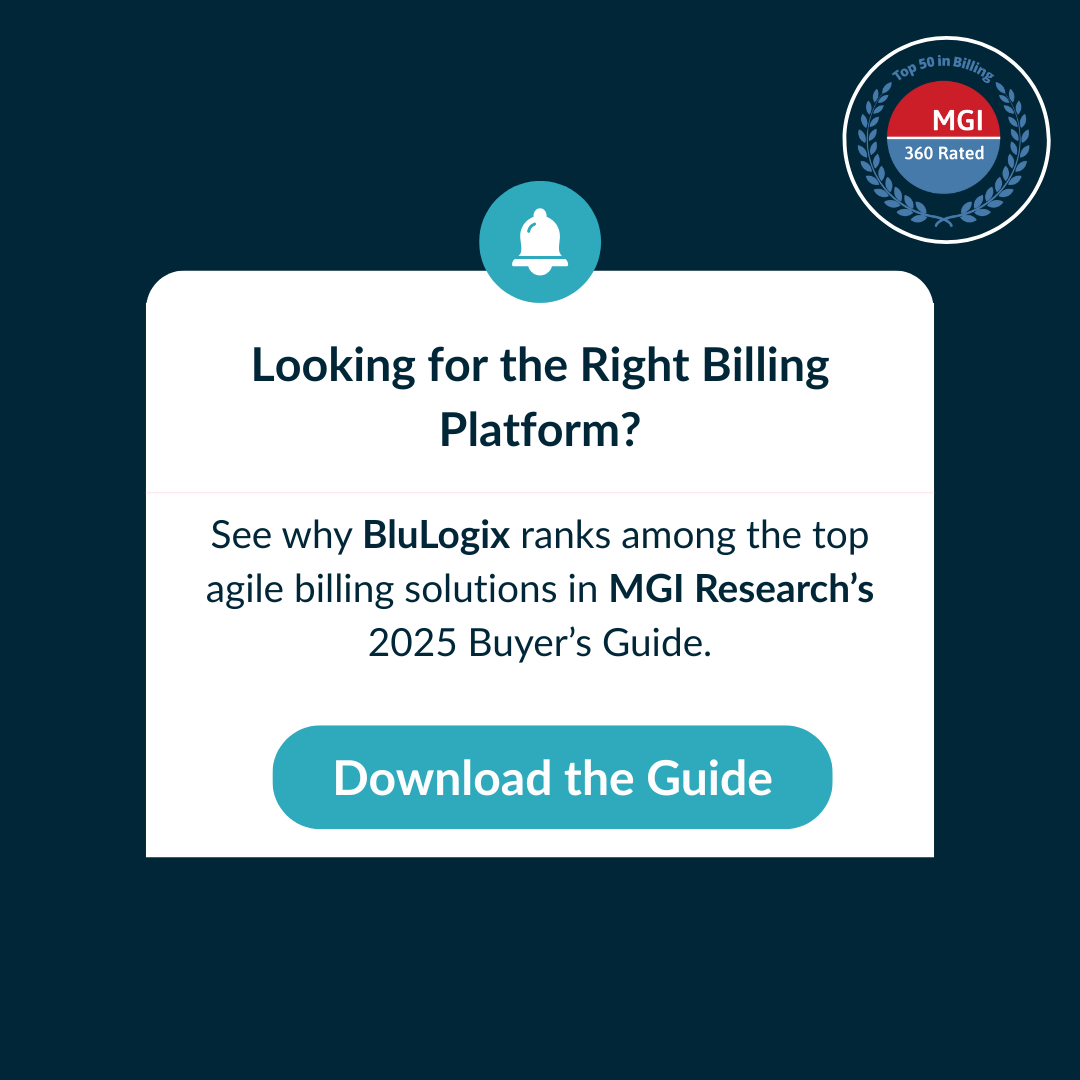Automating Manual Processes to Improve Efficiency
Introduction
In today’s fast-paced digital landscape, efficiency is key to staying competitive. For Managed Service Providers (MSPs), manual processes can be a significant bottleneck, limiting growth, hampering customer satisfaction, and preventing businesses from reaching their full potential. This blog post explores how manual processes impact MSPs, why automation is critical for scaling operations, and the benefits of automating key business functions like billing, provisioning, and service activation.
Ready to see how BluIQ can transform your billing process and help you achieve integrated, automated, and accurate complex monetization? Schedule a demo with a BluLogix billing expert today and take the first step towards revolutionizing your revenue management.
The Impact of Manual Processes on Efficiency and Customer Satisfaction
Despite advancements in technology, many MSPs still rely on manual processes for critical operations such as billing, provisioning, and service management. These manual workflows are often labor-intensive, time-consuming, and prone to errors, ultimately hindering overall efficiency.
Manual billing processes, for instance, are not only inefficient but also prone to inaccuracies, leading to billing errors that can negatively affect customer satisfaction. Inaccurate billing can result in overcharges or undercharges, both of which can damage the relationship between MSPs and their customers. Overcharges can lead to customer complaints and churn, while undercharges directly impact the bottom line. Additionally, manual processes are difficult to scale, making it challenging for MSPs to keep up with increased customer demands as they grow.
Customer satisfaction is at the core of any successful MSP business, and manual processes can be a major obstacle in delivering exceptional customer experiences. Long response times, errors in service activation, and delays in provisioning are all common issues that can result from manual operations. In an industry where customers expect seamless, real-time service, relying on manual workflows can severely limit an MSP’s ability to meet those expectations.
Moreover, manual processes often require significant staff time and effort, which can lead to resource constraints. Employees may end up spending hours on repetitive tasks such as data entry or invoicing instead of focusing on more strategic, value-added activities. This not only hampers employee productivity but also impacts overall business growth, as the potential for innovation and improvement is restricted by time-consuming manual work.
Benefits of Automating Billing, Provisioning, and Service Activation
- Improved Accuracy and Reduced Errors
Manual processes are prone to human errors, especially when dealing with large volumes of data. Automation helps reduce these errors by standardizing workflows and eliminating the need for repetitive manual tasks. This is particularly important for billing, where accuracy is crucial to maintaining customer trust and avoiding revenue leakage.
Billing errors can lead to customer dissatisfaction and disputes, which can be costly to resolve. By automating the billing process, MSPs can ensure that invoices are generated accurately and consistently, minimizing the risk of errors and fostering a positive customer relationship. Automated billing also makes it easier to handle complex pricing models, such as consumption-based billing, tiered pricing, or bundled services, which can be challenging to manage manually.
- Enhanced Customer Satisfaction
Customers today expect prompt, seamless service delivery. Automated provisioning and service activation allow MSPs to meet these expectations by significantly reducing the time required to activate new services or resolve issues. Faster service delivery translates to happier customers and higher retention rates.
When customers experience delays or issues with service activation, their perception of the provider can be negatively impacted. Automation addresses these pain points by ensuring that services are activated quickly and efficiently, allowing customers to enjoy a smooth onboarding process. Additionally, automation provides greater transparency, allowing customers to track the progress of their service requests in real-time, further enhancing the overall experience.
- Scalability for Business Growth
As MSPs grow, managing manual processes becomes increasingly difficult and unsustainable. Automation provides the scalability needed to handle a growing customer base without the need for additional staff. Automated systems can handle repetitive tasks more efficiently, allowing MSPs to focus on strategic activities that drive growth.
Scalability is a key advantage of automation. As the number of customers and services offered increases, manual processes can become a bottleneck, limiting the ability to grow effectively. Automation enables MSPs to scale their operations seamlessly, ensuring that processes such as billing, provisioning, and service management can handle increased demand without compromising quality or efficiency. This scalability is essential for MSPs looking to expand their offerings and enter new markets.
- Cost Savings and Operational Efficiency
Automation not only improves accuracy and speed but also leads to significant cost savings. By reducing the amount of time and resources required for manual tasks, MSPs can allocate their workforce to more value-added activities, such as customer support and business development. This increased efficiency ultimately contributes to a healthier bottom line.
Cost savings can also be realized through the reduction of errors and the avoidance of revenue leakage. Manual processes often lead to mistakes that can be costly to correct, whether they involve billing inaccuracies or delays in service delivery. By automating these processes, MSPs can minimize errors, reduce operational costs, and improve overall profitability.
- Better Resource Allocation
With automated processes in place, MSPs can free up their resources—both human and financial—to focus on core business functions. Instead of spending time on repetitive tasks, teams can work on strategic initiatives that contribute to business innovation and growth. This can include developing new service offerings, enhancing customer support capabilities, or improving internal processes.
Automation also enables better workforce planning. By reducing the need for manual intervention in routine tasks, MSPs can optimize their staffing levels and ensure that team members are allocated to the areas where they can make the most significant impact. This leads to a more agile and responsive organization that can adapt quickly to changing customer needs and market conditions.
- Increased Agility and Competitive Advantage
In a competitive industry like managed services, being able to respond quickly to customer demands and market changes is crucial. Automation provides MSPs with the agility they need to stay ahead of the competition. Automated workflows allow MSPs to quickly adapt to new requirements, launch new services, and respond to customer requests without the delays associated with manual processes.
By embracing automation, MSPs can position themselves as leaders in the industry, offering faster, more reliable services than competitors who still rely on manual methods. This competitive advantage can be a key differentiator in attracting and retaining customers in an increasingly crowded market.
- Real-Time Insights and Data-Driven Decision Making
Automation also provides MSPs with access to real-time data and insights, which are essential for making informed business decisions. Automated systems can collect and analyze data from various sources, providing valuable insights into customer behavior, service usage, and operational performance. These insights can be used to identify areas for improvement, optimize service delivery, and develop new offerings that align with customer needs.
With real-time data at their fingertips, MSPs can make proactive decisions that enhance efficiency, improve customer satisfaction, and drive business growth. Data-driven decision-making is a key advantage of automation, allowing MSPs to stay ahead of trends and respond quickly to changing customer demands.
Conclusion
Manual processes are a major hurdle for Managed Service Providers looking to scale their operations and deliver exceptional customer experiences. Automation is the key to overcoming these challenges, offering improved accuracy, scalability, and efficiency. By automating billing, provisioning, and service activation, MSPs can reduce errors, enhance customer satisfaction, and position themselves for sustainable growth in an increasingly competitive market.
Automation is not just about reducing manual work; it’s about transforming the way MSPs operate and deliver value to their customers. As the subscription economy continues to grow, embracing automation is essential for staying ahead of the curve. By leveraging automation, MSPs can optimize their operations, improve resource allocation, and gain a competitive edge that drives long-term success.
In the next post, we will explore how MSPs can manage multi-tier channels effectively to further streamline their operations and enhance their service offerings. Effective channel management is another critical component of building a successful MSP business in the subscription economy, and we’ll dive into the strategies that can help you achieve it.
Ready to see how BluIQ can transform your billing process and help you achieve integrated, automated, and accurate complex monetization? Schedule a demo with a BluLogix billing expert today and take the first step towards revolutionizing your revenue management.
Learn more

What’s the Best Billing & Revenue Management Software? The One That Scales Strategy and Satisfies Finance

Features That Power Complex B2B Contracts — And How BluLogix Delivers Them



